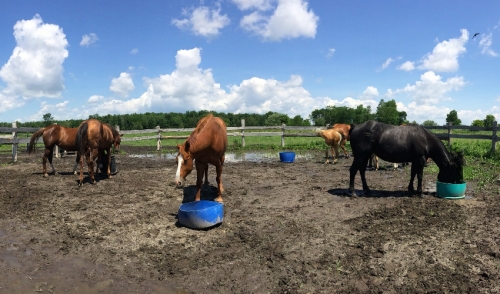
The Importance of Fats in Horse Nutrition
It is well known even to non-horse people that horses are herbivores, but just grazing or feeding a horse a diet of hay alone will not provide them the proper nutrition. A limited amount of fat is essential for more energy, and there are many additional benefits of providing fat in your horse's diet.
Fat as Energy
All horses burn calories as energy, and very active horses with a heavy work schedule, athletic training routines or extensive show schedules need more energy in their diet. Gestating or nursing mares also need more energy to keep up their strength as they nurture their foals. No matter what a horse's higher energy needs, fat can supply that energy in a more compact, quickly consumed way than low-fat feed.
Other Benefits of Fat
In addition to providing abundant energy, some fat in a horse's diet will show additional benefits, such as…
- A sleek, healthy coat with a rich gleam, ideal for show horses or to make a better impression with stud horses or any animal that may be marketed or sold.
- Increased endurance while working or training, due to how fat energy is converted and less of a buildup of lactic acid that can lead to soreness.
- Greater heat tolerance in warm climates, as digesting fat generates less internal body heat that can cause a horse's core temperature to rise.
- Lower risk of starch-related illnesses such as colic and laminitis, particularly for horses that may already have delicate digestive concerns.
- Faster weight gain for underweight horses recuperating from an illness or injury, or that may need extra help to attain or keep a healthy weight.
Feeding Horses Fat
A typical horse feed contains 2-3.5 percent fat, and any percentage higher than 3.5 is considered a high fat diet. Some feeds are formulated to provide that high fat content, or adding vegetable-based oil to the feed can serve as a fat supplement. Fat-based powders and tablets are available, or liquid oils can be mixed into regular feed. Linseed, flax, corn, soy and fish oils are the most popular, and rice bran is also a good choice for adding fat to a horse's diet.
Before opting for high fat feed, it is important to check with your veterinarian to be sure your horse's nutritional needs are being met. When changing the diet to include more fat, make the alterations gradually over a period of 2-3 weeks to give the horse's digestive system time to adjust without distress, illness or other trouble.
Fat can be an important part of any horse's diet, and understanding the benefits of fat and how to easily offer it to your horse is a great way to be sure the animal is getting exactly the nutrition it needs.
